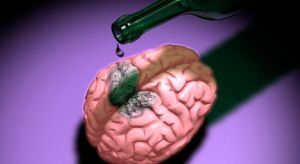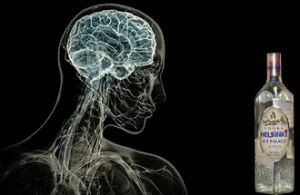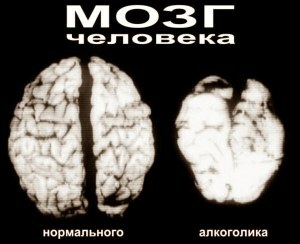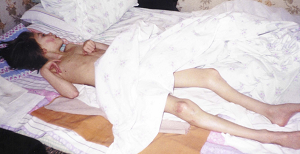 When a person drinks alcohol, he gets into the blood and quickly spread throughout the body. Since the brain is very abundantly supplied with blood, it begins to experience its negative effect in a few minutes after taking alcohol.
When a person drinks alcohol, he gets into the blood and quickly spread throughout the body. Since the brain is very abundantly supplied with blood, it begins to experience its negative effect in a few minutes after taking alcohol.
The activity of the brain is based on two main processes: excitation and inhibition. Alcohol inhibits the inhibition function, which makes human behavior uncontrolled and often completely unreasonable.
Nerve cells of the brain - neurons, under the influence of alcohol quickly die. This is due to the fact that alcohol lingers in them and causes toxic poisoning. And this is only a small part of the problems that arise.
The central nervous system( CNS) is also experiencing great difficulties. Alcohol dulls eyesight, the speed of motor reactions, virtually completely lost self-control, the ability to reason and reason. There may be unreasonable joy, aggression, sudden mood swings.
Contents
- Alcoholic dementia
- Types of alkalobism
- Causes of development and mechanisms of occurrence
- Falling and alcoholic degradation step by step
- How it looks in life
- Diagnostic techniques and criteria
- Approach to therapy - defeating yourself to live
Alcoholic dementia
With regular usealcohol the human nervous system, his brain, are under constant destructive influence.
Neurons are gradually dying off, the work of the still functioning cells undergoes changes and disturbances. Since these cells are not actually restored or restored very slowly, the mass destruction of neurons after a while is expressed in progressive disorders of the psyche, a violation of the normal thinking process, the ability to clearly and logically think. 
If a person drank for many years, then he is threatened with such a disease as alcoholic dementia - dementia, which arises from the constant and prolonged damage to neurons by alcohol. Usually dementia concerns already elderly people, but there are cases when such a disease is observed and in relatively young lovers drink.
A person afflicted with alcoholic dementia, loses the opportunity to speak normally, experiences serious memory problems, loses the ability to reason and speak, and there are also noticeable problems with the perception of the surrounding reality.
Types of alkalobium
Depending on which parts of the brain and central nervous system functions are degraded most, there are 3 main types of dementia development in alcoholism:
- Cortical dementia. This variant of the disease is characterized by a disruption in the functioning of the cerebral cortex and those processes for which it is responsible. The most affected functions of the psyche in this case are memory, as well as consciousness. A person suffering from this kind of dementia, very forgetful, may lose the opportunity to speak normally, or generally, to write, read, use household items, he does not recognize his family and friends, doctors, there comes a complete regress of personality. Self-consciousness, too, suffers - often the patient does not remember either his name or his residence - absolutely nothing.
- Subcortical dementia. In this case, the most affected elements are the subcortical areas, as well as the vessels of the brain. The most affected with this kind of dementia is the nervous system. Although such serious and notable violations, as in the previous case, are not observed here, but the patient becomes very nervous, irritable, he often suffers from insomnia, stress, depression. It is worth noting that, at the initial stages of the disease development, the line between cortical and subcortical forms of the disorder is relatively arbitrary and it can easily shift or even disappear.
- Multifocal dementia. This type of disease is accompanied by destruction processes or necrosis in many parts of the brain. In this case, there may be malfunctions in the operation of any function for which the brain and the central nervous system are responsible: memory loss, a person loses the ability to navigate in space, the ability to speak and write is lost. A patient with multifocal dementia may for many hours fixate on one thought or process, and is completely unable to spontaneously get rid of it.

Causes of development and mechanisms for the onset of
Mechanisms that explain how exactly the alcohol damage of the brain and the central nervous system occurs are still very poorly understood and under active surveillance and study.
While in medical practice it is accepted to consider such main ways of negative influence of alcohol and occurrence of alcoholic dementia in any of its forms:
- Brain tissues are exposed to toxic effects of .As mentioned above, alcohol penetrates the brain due to circulation in the blood and worsens the work of neurons. Nerve cells are rather tender and unable to withstand the impact of such a powerful toxin, so they die very quickly. Considering that neurons are not regenerated and are not generated in any way, such defects gradually accumulate.
- Alcohol, and especially the so-called metabolites of ethanol, for example, acetaldehyde, which are part of it, have a very negative effect on the nerve cells of .Therefore, the constant use of alcohol leads to the defeat of the central nervous system.
- Failures in the circulation and operation of the brain vessels .Vessels of the whole body, and even more so of the brain, are very badly damaged by alcohol. They get less oxygen, vitamins, and beneficial microelements, which ultimately leads to their destruction. After the vessels, the cells that they fed were also killed.
These are the 3 main processes contributing to the onset of dementia.

Falling and alcoholic degradation step by step
Like any other disease, alcoholic dementia develops gradually, which can be observed by such characteristic symptoms:
- marked decrease in intelligence and ability to perceive information;
- desires and instincts gradually take precedence over reasonable decisions and the will of man;
- lost such concepts as conscience, shame;
- cognitive aspirations are reduced gradually to zero;
- further begins to disappear memory, until complete oblivion;
- in the extreme stages of a person loses the ability to normal everyday processes: to talk, talk, read.
These processes can take place in a completely different order, it depends on the type of dementia and which parts of the brain are most damaged.
With regard to the severity of dementia, the disease in its development occurs in three stages: 
- Easy degree dementia does not prevent a person from living normally and coping with domestic problems, but expressed in violations in the intellectual sphere.
- Moderate degree of severity is characterized by increased forgetfulness, a person can long remember how to turn on the stove or TV, noticeable disturbances in consciousness and attitude with the surrounding world.
- The severe degree of is diagnosed in the general and final decay of the human intellectual sphere. At this stage, a person becomes completely incompetent, loses memory, ability.
How it looks in life
Being a sick dementia at every stage of its development, a person expresses this quite clearly by his external behavior, conversations, emotions.
An easy degree of dementia is accompanied by forgetfulness, confusion in time and space, recurring problems with memory. Often such people begin to behave frivolously and, as they say, "childishly" - to argue unjustifiably, to avoid any responsibility, to sharply change the mood.
Further, when alcoholic dementia progresses more and more, the following symptoms can be observed:
- fading mental abilities;
- inability to maintain a long attention on one issue;
- limited views and conversations;
- serious memory dips.
The further the disease develops, the more all these symptoms are delineated and complicated. At the output, a person becomes completely weak-willed and thoughtless, loses normal human capabilities, and the personality disintegrates.
Diagnostic methods and criteria
 When a person exhibits the above symptoms and is questioned about the presence of developing alcoholic dementia, he needs to undergo a diagnosis that will accurately indicate the causes of the development of the disorder and the actual stage of dementia:
When a person exhibits the above symptoms and is questioned about the presence of developing alcoholic dementia, he needs to undergo a diagnosis that will accurately indicate the causes of the development of the disorder and the actual stage of dementia:
The neurologist can independently determine the presence of the disease and by external signs, but additional methods of diagnosing the disease are often used.
Among others, the most commonly prescribed procedures are:
- MRI of the brain is a procedure showing the activity of different parts of the brain, which makes it possible to see in it any serious changes and irregularities;
- duplex scanning of brachycephalic arteries is an ultrasound examination of vessels that can show the abnormalities in them, constrictions, deformations and tears;
- study of the mental and psychological state of a person .
Most often, these diagnostic methods are combined with constant medical supervision. Only the dynamics of the development of the disease best indicates its true essence.
Approach to therapy - defeating yourself to live
After receiving the results of the studies, careful observation, the doctor can indicate the optimal means and methods of treating the appropriate stage of alcoholic dementia. Usually the fight against the disease includes such components:
- Fighting the symptoms of .Despite the source of the problems, they all need to be tried to solve. Therefore, if a person has high blood pressure, fatigue, dizziness and similar negative manifestations, they must be combated with the means used for this.
- The most important step in the victory over dementia is completely refusing alcohol .It was alcohol that became the source of the problem,
 therefore it must be deleted forever without any compromises.
therefore it must be deleted forever without any compromises. - Drugs are prescribed that improve blood circulation in the brain of .Vascular atrophy is an important part of the problem, which is why it is so important to restore their normal functioning in the fight against dementia. For this, the doctor ascribes the appropriate drugs.
- There are a number of drugs that stimulates active brain work and the mental activity of .They contribute to feeding into the brain precisely those substances that activate mental activity, for example, glucose.
- Means against insomnia and sedatives is also often credited in the fight against dementia. This is due to the fact that this disease in most cases is accompanied by a bad sleep and increased nervousness.
- As in the aftermath of alcoholism the body is comprehensively weakened and depressed, the patient is prescribed complexes of vitamins, amino acids, various antioxidants , which help a person to strengthen their general health.
In the aftermath of an illness, a person may experience a decline in mental and physical strength, problems with intellectual activity, forgetfulness. Often, dementia leaves behind a vascular disease, headaches, weakening of all body forces.
 But a healthy lifestyle, proper nutrition and total rejection of bad habits can give a person a chance for a less healthy life.
But a healthy lifestyle, proper nutrition and total rejection of bad habits can give a person a chance for a less healthy life.
Regarding the issue of prevention, preventive measures here completely depend on the causes that cause the disease. The very first thing is to avoid excessive alcohol consumption, because this is the main reason for the development of dementia.
Constant physical activity, mental work, rich in vitamins nutrition will help to keep health as long as possible and to avoid such serious troubles.



